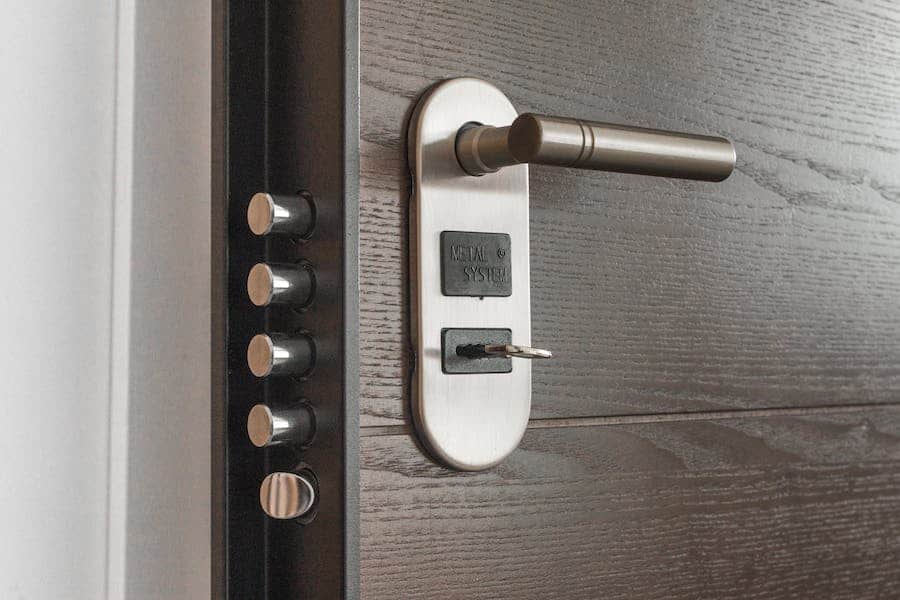In the complex realm of landlord-tenant relationships, the question of whether a landlord can change the locks is one that often sparks confusion and concern. This article seeks to shed light on this matter, addressing landlords’ and tenants’ rights and responsibilities. By delving into the legal framework, permissible scenarios, and potential consequences, we aim to provide a comprehensive guide for individuals navigating this particular aspect of the landlord-tenant dynamic. Understanding these rights and obligations is crucial for maintaining a fair and harmonious living arrangement for all parties involved.
Can A Landlord Change The Locks?
Yes, a landlord can change the locks, but it must be done legally and with proper notice. Landlords cannot change locks without providing tenants notice and access to the property, as per state and local laws. Unauthorized lock changes may result in legal consequences for the landlord.
Understanding Landlord-Tenant Relationships
Understanding the dynamics of landlord-tenant relationships is fundamental for both property owners and renters alike. At its core, this relationship involves a contractual agreement wherein a landlord allows a tenant to occupy and use a property in exchange for rent payments. Clarity in these relationships is vital to ensure a smooth and mutually beneficial living arrangement.
The legal framework governing landlord-tenant relationships varies by jurisdiction but generally encompasses federal, state, and local laws. These laws delineate the rights and responsibilities of both parties, covering aspects such as rent, property maintenance, security deposits, and eviction procedures. Understanding and adhering to these laws is crucial to avoid disputes and legal complications.
Central to a landlord-tenant relationship is the lease or rental agreement, which serves as a legally binding contract. It outlines the terms and conditions of the tenancy, including rent amount, payment schedule, rules regarding property use, and the duration of the lease. Both landlords and tenants should thoroughly review and understand the lease terms before signing to prevent misunderstandings down the line.
Ultimately, fostering open communication, adhering to legal requirements, and respecting the terms of the lease are the cornerstones of a successful and harmonious landlord-tenant relationship. By recognizing their respective rights and responsibilities, landlords and tenants can create an environment that is fair, transparent, and conducive to peaceful coexistence.
Responsibilities Of Landlords
Landlords bear several important responsibilities to ensure a safe and fair living environment for their tenants. Understanding these duties is essential for property owners to maintain positive landlord-tenant relationships and comply with legal requirements. Here are some key responsibilities of landlords:
- Providing Habitable Living Conditions: Landlords must maintain a property that meets minimum habitability standards. This includes ensuring the property has proper heating, plumbing, and electrical systems and is free from hazards like mold or pest infestations.
- Maintenance And Repairs: Landlords must promptly address maintenance and repair issues. This includes fixing broken appliances, leaks, or structural problems that may arise during the tenancy. Tenants have the right to live in a property in good repair.
- Respect For Tenant’s Privacy: Landlords must respect their tenant’s privacy rights. Generally, landlords must provide reasonable notice before entering a rental property, except in emergencies or agreed-upon situations.
- Following Lease Agreements: Landlords are expected to abide by the terms of the lease or rental agreement. This includes honoring the rent amount, payment schedule, and any other agreements outlined in the lease document.
- Security Deposits: Landlords are typically responsible for handling security deposits properly. This includes documenting the property’s condition before and after the tenancy, returning the deposit within the time frame mandated by local laws, and providing an itemized list of deductions if any.
- Compliance With Local Laws: Landlords must adhere to local, state, and federal laws related to rental properties. These laws may cover matters such as rent control, anti-discrimination, and eviction procedures.
- Safety And Security: Landlords should take reasonable steps to ensure the safety and security of their rental properties. This may include providing adequate lighting, functioning locks, and addressing safety concerns.
- Non-Retaliation: Landlords cannot retaliate against tenants for asserting their legal rights, such as requesting repairs or reporting code violations.
Responsibilities Of Tenants
Tenants also have important responsibilities to maintain a positive and mutually respectful relationship with their landlords and to comply with legal requirements. Understanding and fulfilling these responsibilities is essential for a smooth and trouble-free tenancy. Here are some key responsibilities of tenants:
- Paying Rent On Time: Tenants are obligated to pay rent according to the terms outlined in the lease or rental agreement. Timely rent payments are crucial to maintaining a positive landlord-tenant relationship.
- Reporting Maintenance Issues: Tenants should promptly inform their landlords of any maintenance or repair issues during the tenancy. This includes problems like leaks, malfunctioning appliances, or structural issues.
- Complying With Lease Terms: Tenants are expected to adhere to the terms and conditions of the lease or rental agreement. This includes following rules regarding property use, such as restrictions on smoking, keeping pets, or making alterations to the property without permission.
- Respecting The Property And Neighbors: Tenants should treat the rental property with care and respect. This includes keeping the property clean and undamaged and avoiding behavior that disturbs neighbors.
- Providing Access For Inspections And Repairs: Tenants must allow their landlords access to the property for inspections and necessary repairs, provided proper notice is given and in accordance with local laws.
- Notifying Landlord Before Moving Out: When tenants intend to move out, they typically need to provide proper notice to their landlords as stipulated in the lease agreement. This allows the landlord time to find a new tenant and plan for property turnover.
How To Handle Lock Changes?
Handling lock changes, whether initiated by the landlord or tenant, requires careful communication, documentation, and adherence to legal procedures. Here are the steps to handle lock changes effectively:
- Communication With The Landlord: If you are a tenant who wishes to change the locks for security reasons, discuss your concerns with the landlord first. Explain the specific reasons behind your request and try to reach a mutual understanding.
- Review The Lease Agreement: Refer to your lease or rental agreement to understand the terms and conditions related to lock changes. Some leases may contain clauses specifying whether tenants are allowed to change locks and under what circumstances.
- Request Landlord’s Permission: If your lease requires landlord approval for lock changes, formally request their permission in writing. Provide details about the type of lock you intend to install and the reason for the change.
- Seek Legal Advice (If Necessary): If you encounter resistance from the landlord or believe your safety and security are at risk, consult with a legal professional to understand your rights and options.
- Choose A Reputable Locksmith: If you receive permission or decide to change the locks yourself, choose a reputable locksmith to perform the task. Ensure the locksmith is licensed and bonded if required in your area.
- Keep The Old Locks: If you are a tenant, it’s usually advisable to keep the old locks and provide copies of the new keys to the landlord. This allows you to restore the original locks when you move out, preventing disputes over security deposit deductions.
- Document The Change: Document the lock change by taking photographs or videos of the old and new locks, as well as the keys. This can be crucial in case of disputes or misunderstandings in the future.
- Notify The Landlord (If Necessary): If your lease requires you to notify the landlord after changing the locks, do so promptly. Provide them with copies of the new keys and any relevant information.
- Follow Local Laws: Ensure that the lock change complies with local laws and regulations regarding rental properties. Some areas may have specific requirements or restrictions on lock changes.
- Keep Records: Maintain records of all correspondence, approvals, and any agreements related to the lock change. This will be valuable in case of any future disputes.
Conclusion
In conclusion, understanding the intricacies of lock changes in landlord-tenant relationships is vital for maintaining a harmonious living arrangement. Both landlords and tenants must navigate this aspect of property management with care, adhering to legal requirements and open communication. By respecting each other’s rights and responsibilities and seeking resolution through proper channels, conflicts can be minimized. Ultimately, fostering cooperation and mutual respect not only preserves the integrity of the lease agreement but also contributes to a safer and more secure living environment for all parties involved.
FAQ’s
Can A Landlord Change The Locks Without Notice?
No, landlords typically cannot change locks without providing proper notice to tenants, as this infringes on a tenant’s right to access their rented property.
Can A Tenant Change The Locks Without Permission?
It depends on the lease agreement and local laws. In many cases, tenants need landlord approval or should follow specific procedures when changing locks.
What Should I Do If My Landlord Changes The Locks Without Notice?
If this happens, document the situation, contact your landlord immediately, and seek legal advice if necessary to protect your rights.
Can I Change The Locks For Safety Reasons?
Yes, tenants often have the right to change locks for safety, but it’s advisable to inform and seek permission from the landlord or follow lease requirements.
What If I Lose My Keys As A Tenant?
Notify your landlord promptly if you lose your keys. They may provide a spare set or arrange for a locksmith, but tenants may be responsible for the associated costs.




















Leave a Reply